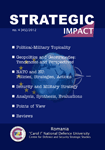THE CONTEMPORARY POWER RELATIONS IN THE GEOPOLITICAL CONFLICT ZONES. THE CASE OF AFRICA AND MIDDLE EAST
THE CONTEMPORARY POWER RELATIONS IN THE GEOPOLITICAL CONFLICT ZONES. THE CASE OF AFRICA AND MIDDLE EAST
Author(s): Dorel Buşe, Cristina AvramSubject(s): International relations/trade, Security and defense, Military policy, Geopolitics, Peace and Conflict Studies
Published by: Carol I National Defence University Publishing House
Keywords: Geopolitics; power relations; “The Great Middle East”; conflict zones; Trans-Saharan partnership; Maghreb;
Summary/Abstract: Initially considered a “lost continent”, Africa gradually turned into a territory with a strategically international importance. Due to rising global energy demands, ongoing terrorism in the Middle East and North Africa, China’s activities in Africa, arms proliferation, environmental degradation, poor governance and human rights abuses, Africa is becoming steadily more important for the strategic interest of United States and to the rest of the world – as a source of energy – Russia, India, European Union, Turkey and Brazil being among the international actors that have started to value the resources of Africa. Moreover, the North of Africa together with the Middle East enjoy high geopolitical importance. Situated at the cross of Europe, Asia, and Africa, this region – ancient cradle for civilizations and birthplace of three monotheistic religions, hub of trade, a major base for vast empires, a ground for the most explosive and lasting conflicts following World War II – has interest not only because of its geographical strategic position, or the population concentration and human vector, but also because of its oil, which is the raw material required for modern technology.
Journal: Strategic Impact
- Issue Year: 2012
- Issue No: 45
- Page Range: 42-51
- Page Count: 10
- Language: English

